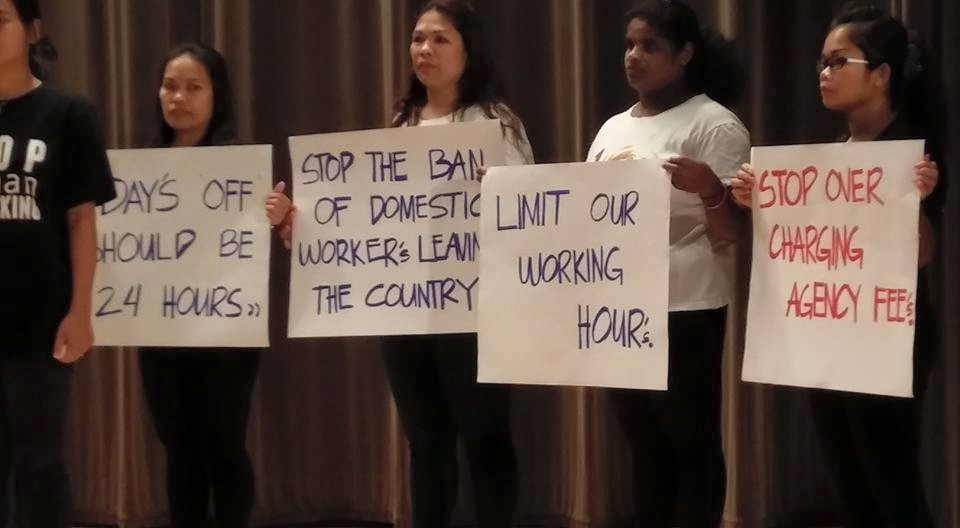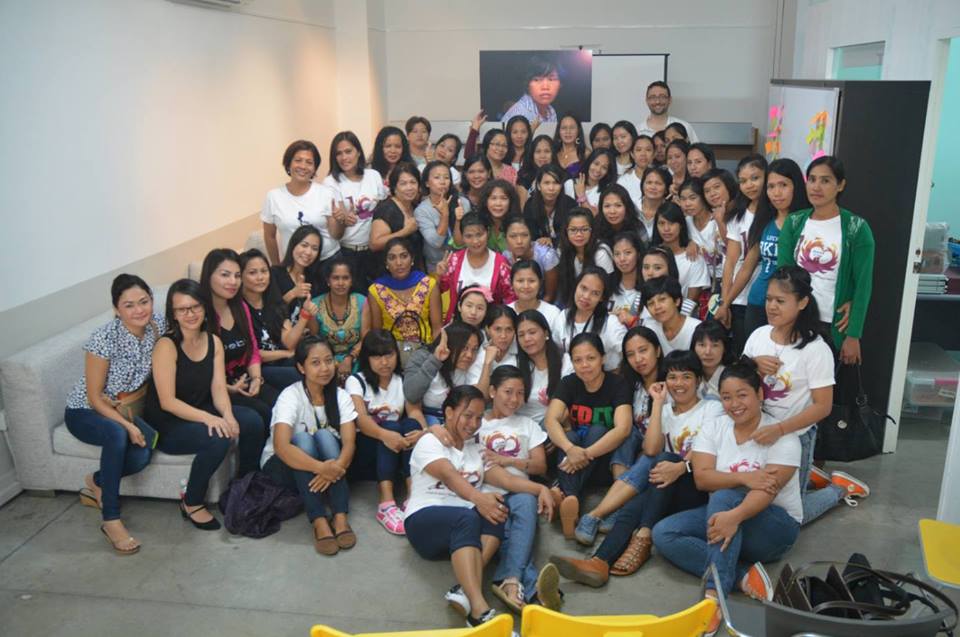 [1]
[1]Foreign domestic workers demand protection and better living conditions. Photo: Facebook / “HOME”
The Humanitarian Organization for Migrant Economics, or “HOME,” aims to “give voice to the voiceless” in Singapore by providing a platform [2] (a website called “MyVoice”) for migrant workers to write and upload their stories, articles, photographs, and poetry. The advocacy group also offers assistance to abused workers.
According to government data [3], Singapore is home to 1.3 million registered foreign workers. More than 200,000 of these people are domestic workers, mainly from neighboring countries like the Philippines, Indonesia, Myanmar, and India.
In recent years, reports have surfaced about domestic workers experiencing maltreatment [4] at the hands of their employers. Case of abuse are rising, despite new laws designed to protect [5] domestic workers’ rights. Last month, a Singaporean news website reported a story [6] about the slave-like conditions of more than 9,000 foreign workers.
Many of the stories and poems published on MyVoice are heartbreaking testimonies that are seldom heard or reported in Singapore. These stories highlight the plight of foreign domestic workers, the majority of whom are young women who left impoverished families in their respective countries to seek better opportunities in Singapore.
Myrna Javier, for example, wrote [7] a poem about a child whose mother is working in another country. An excerpt of the poem reads:
Father, where is my dearest Mama?
Tearfully ask the little one.
Papa can’t give her the right answer
That Mama went to seek for a job on a foreign land
To give us all the better life and free us all from all this strife.Suppressed happiness in exchange of a dime to a dollar.
Scarcity, of everything, shelter, food and tattered clothes
Simple yet happy filled with love and unity.Hush dear child, be patient and good.
Dear Mama will be home
Until then let’s smile at the sun and moon
She’ll be with us forever soon
 [8]
[8]Members and volunteers of HOME hold a solidarity event for a detained Filipino domestic worker in Indonesia. Photo: Facebook / “HOME”
Bhing Navato’s poem captures [9] the experience of many domestic workers who have encountered abuse and sought assistance from groups like HOME:
When I decided to leave my country,
The hardest part was leaving my family.
When I looked at my children, it broke my heart
My husband’s teary eyes tore me apart.I arrived here full of hope,
I prayed day by day so I could cope.
With three houses to clean in a week,
Rice and eggs for my meals, it really made me weak.My sleeping area was inadequate,
Although I had a mattress, a pillow and a blanket.
Beside the fish tank was my place to sleep.
Every night, I told the fish,
You’re lucky, you have a crib.I almost lost my temper one day
When she came to me with only harsh words to say.
I looked at her and thought this way:
The day will come when I will have my way.Finally it happened, I finished my contract,
Asked for a transfer, but she wanted to send me back.
I was surprised, it was really unfair
I worked so hard, she didn’t even care.So I decided to leave without permission,
Running away was my only option.
I went to HOME, they guided me all along,
They helped me in everything, taught me how to be strong.
Desi, an abused Indonesian domestic worker, found the inspiration [10] to help others:
Though clueless about Singapore when I arrived in 2014, I was filled with hope. But, only a few days into my work, my employer started to abuse me very badly. A friend helped me escaped after seeing the fear in my eyes and black and blue swelling on my face.
HOME took me into their shelter. I was traumatized, frightened and extremely sad. It was a good intention that brought me to work in Singapore and I cannot understand why I was treated so horribly. That was probably why so many people came to help me.
Even though my family is far away, I have many friends who are very supportive. I don’t have to be embarrassed about my mistreatment because I have done nothing wrong. Now I have found a new dream, a mission in life: helping others. But first, I have helped myself.
This poem by Rosita Madrid Sanchez reflects [11] the story of workers who learned to assert their rights:
As a foreign domestic worker, I have been away for 7 years, and within these years, I have been blindfolded myself. My rights were taken away by my employers and they took away the real me. I just let it go for the sake of earning dollars to send home for my kids.
I can’t be happy, I can’t be sad, I can’t feel the feeling of being a mother because I don’t have the rights to feel so. But you as an employer, do you feel the sadness when you are away from your kids, when you go overseas for work? Do you feel that from hearing the voice of your kids you will know if they are ok? How about me? I am a mother too, I am also human. I can feel these feelings, I can feel all that you can.
But starting this day, I am standing for myself. I am standing for my kids and I am standing for their future, for my future. Stop discrimination. Stop being blindfolded.
Maria Allen Cellan urges [12] fellow migrant workers to keep pursuing their dreams:
Whatever our dreams are, we should never stop reminding ourselves why we are in a foreign country, working hard. We should always be thinking about what’s possible for us in our lifetime. I am pretty sure that most of us don’t want to spend the rest of our lives working overseas and away from our families. We need to keep our dream alive in our hearts, even as we are pushed to work harder and harder every day, enduring all the pains caused by work, all the sleepless crying nights, the homesickness, the starvation and even the lack of freedom and dignity for ourselves. All this endurance should not be wasted.